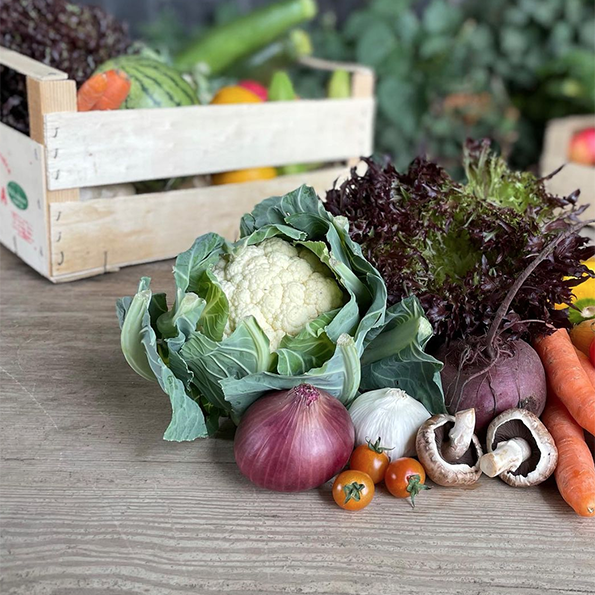In this series of guest blogs, Lynne Davis from the Open Food Network describes the business models of some of the food hubs and producers in their community. Here, in the sixth blog of the series, Lynne introduces Cambridge Food Hub.
Cambridge Food Hub is a business to business food hub in Cambridge working to connect local food producers with cafes, restaurants and shops across the city.
They take an ecosystem approach to connecting the food system, pioneering approaches to circular economy and waste reduction through their operations.

Cambridge Food Hub launched in 2019 in response to a need recognised within the community to improve the sustainability of the food system in Cambridge. Duncan Catchpole founded the hub to complement his successful veg box delivery service, Cambridge Organics.
What makes Cambridge Food Hub unique?
As a business to business scheme Cambridge Food Hub does not add a markup to produce. Instead their innovative business model asks for an annual membership fee from buyers to gain access to the shopfront.

The model means that their buyers benefit from direct prices, meaning that the scheme is cheaper than wholesale, but still maintains the convenience of buying from many producers at once. The membership fee covers the cost of managing and delivering, and gives a reliability of income as an annual flat fee.
The team at Cambridge Food Hub focuses on building local food ecosystems.
“We use the term local food ecosystem because we like to be inspired by natural ecosystems. We work to share and distribute resources in a way that allows all actors to connect and benefit” says Alice Guillaume, who began working with Cambridge Food Hub as an intern. Her drive and passion has been key to building Cambridge Food Hub over the past two years.
“We work to share and distribute resources in a way that allows all actors to connect and benefit.”
“One of the first schemes we trialled was the Green Coffee Shop scheme. We would deliver to coffee shops, and pick up coffee grounds which would go to a local company that turned them into fire briquettes or would go to a local farm to be composted. At the farm we’d pick up vegetables.
Building the circular economy in this way captured people’s imagination resulting in a bit of publicity that helped us grow. The scheme stopped during COVID when the coffee shops closed” recalls Alice. The team is currently unsure if it will start again.

Who do Cambridge Food Hub work with?
The long standing relationships with food producers in Cambridgeshire has been a key asset in the development of the model, and simultaneously their biggest area of learning.
“In the first year we built the whole scheme around one key supplier, who then decided not to supply us. Essentially due to a simple misunderstanding”, Alice said. “The challenge showed us the value of clear communication and maintaining those relationships with suppliers.”

Cambridge Food Hub remains closely linked with the parent organisation Cambridge Organics. This relationship enables some efficiencies in logistics, as many suppliers supply for both the retail and business to business hubs.
It also enables staff and resources to be shared across the organisations. This was particularly beneficial during the pandemic. With the close of cafes Cambridge Food Hub sales plummeted, while the retail side of the business boomed. “That diversity definitely made us more resilient”, says Alice.
The two organisations are managed separately, using different software platforms. The retail arm uses Boxmaster Systems while the wholesale arm uses the Open Food Network. While the team recognise that it would save administration to bring all software onto the same system, they also feel a loyalty to the two platforms, who are both working to support the sector.
“I would love for it to be easier to integrate the data from the two platforms, so that we could streamline our packing processes. It doesn’t make sense for us to build our own software.
And it doesn’t make sense for one platform to do everything. We don’t need an Amazon for food systems. This is why I like the work on data interoperability that the Open Food Network is pioneering.”
“This is why I like the work on data interoperability that the Open Food Network is pioneering.”
The Data Interoperability Project
The Data Interoperability Project will aim to make sharing data between businesses working with short food supply chains simpler, such that businesses are better able to collaborate and producers are better able to sell across multiple platforms and outlets without increasing their admin load.
To learn more about this work take a look at the recent webinar:
Local Food Ecosystems: the book!
Duncan Catchpole’s book “Local Food Ecosystems: How Food Hubs Can Help Create a More Sustainable Food System” here
And watch his seminar on how food hubs can help create a more sustainable food system:

